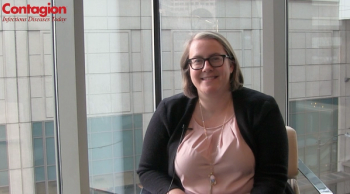
An international team of investigators shares 48-week results from ATLAS-2M, which tested out every other month dosing of the intramuscular injection compared with monthly dosing.

An international team of investigators shares 48-week results from ATLAS-2M, which tested out every other month dosing of the intramuscular injection compared with monthly dosing.

Investigators conducted 2 studies on intravenously administered GS-9722, 1 in HIV-negative participants and 1 in virally suppressed people with HIV.

A generic pre-exposure prophylaxis (PrEP) option would greatly expand coverage among vulnerable populations and may well be the most cost-effective and safe option.

As May draws to a close, the Contagion® editorial staff is recapping the trends and top infectious disease news of the month.

A study using monkeys provides an intriguing glimpse of the possibilities of using CRISPR gene editing technology to knock out HIV reserves in humans.

Melanie Nicol, PharmD, PhD, explores how DMPA hormonal contraception affects women's HIV risk.

Subcutaneous implants are 1 promising strategy to address suboptimal adherence to pre-exposure prophylaxis (PrEP) for HIV, and a recent in silico simulation examined pharmacokinetic profiles and safety of tenofovir alafenamide implants.

Brian Woodfall, MD, discusses how long-acting injectables offer a new treatment option for patients with HIV in terms of long-term therapy.

Paul Sax, MD, names the DISCOVER study as one of the highlights of CROI 2019.

Saye Khoo, MD, advocates for a more appropriate, stratified, risk-based approach to prescribing dolutegravir in pregnant women.

Bluma Brenner, PhD, explains the driving factors behind the push for new antiretroviral drugs for HIV treatment.

Brian Woodfall, MD, shares his opinion on some of the biggest advancements in HIV treatment and prevention.

Paul Sax, MD, reacts to the ATLAS and FLAIR studies on long-acting injectable therapy.

Susan Swindells, MBBS, provides an overview of long-acting injectable cabotegravir + rilpivirine for clinicians.

Karin Bosh, PhD, explains why the opioid overdose death rate was higher in 2015 than in 2011 among people with HIV.

PrEP isn’t covered by health insurance in Germany, and non-prescription use of the HIV preventive is common. But is it safe?

A survey of MSM and transgender women found that diverse formulations and regimens for PrEP, such as long-acting injectables and “on-demand” PrEP, could increase uptake and persistence.

Julia Marcus, PhD, MPH, provides advice for health care systems looking to implement a model to identify potential PrEP candidates.

Ava Avalos, MD, details the effects of a dolutegravir-based regimen on pregnancy.

Paul Drain, MD, MPH, explains how point-of-care viral load testing was successful in providing rapid results to patients in a South African-based study.

A communitywide HIV prevention package including in-home testing and antiretroviral therapy reduces new infections, according to a study from the HIV Prevention Trials Network.

CROI 2019 was held March 4-7, 2018, in Seattle, Washington. The conference featured results of new studies on a variety of HIV topics as well as advancements being made in the field. Here are 5 key takeaways from the meeting.

Kavita Misra, PhD, MPH, explains how health care providers can help prevent PrEP resistance from growing by increasing screening for acute HIV infection.

Julia Marcus, PhD, MPH, discusses the barriers of PrEP use and how current prescribing guidelines are used in clinical practice.

Paul Sax, MD, details his research on integrase inhibitor-based regimens and weight gain.

From the London Patient to the DISCOVER trial and everything in between, HIV experts provide their biggest takeaways from CROI 2019, in the second part of our highlight reel.

A London study shows that men infected with HIV are acquiring HCV at much lower levels than before.

Brad Hare, MD, explains how the findings of the DISCOVER study indicate that PrEP is no longer a one-size-fits-all situation.

From the London Patient to the DISCOVER trial and everything in between, HIV experts provide their biggest takeaways from CROI 2019.

Bluma Brenner, PhD, confesses that HIV "terrifies the hell" out of her, as it continues to build resistance against existing therapy regimens.